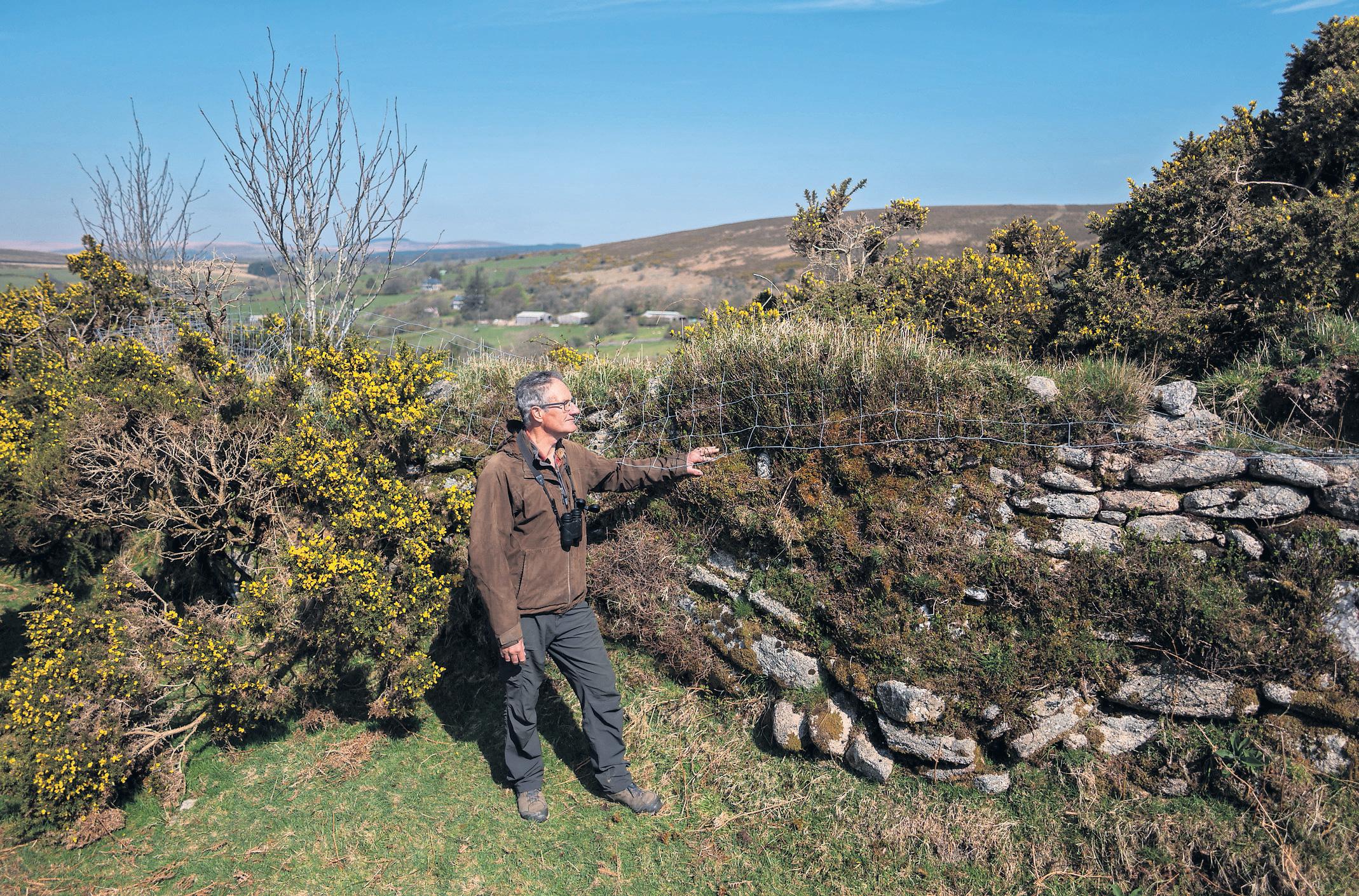Versuchen GOLD - Frei
A beautiful task The re-creation of Britain's ancient hedgerow habitats
The Guardian
|April 19, 2025
The 30-metre ridge runs across the moor near Yar Tor on Dartmoor, one of several faint lines that crisscross the land like aeroplane contrails. Although the open moorland looks wild, we are standing on some of Britain's oldest farmland.

The 30-metre ridge runs across the moor near Yar Tor on Dartmoor, one of several faint lines that crisscross the land like aeroplane contrails. Although the open moorland looks wild, we are standing on some of Britain's oldest farmland. These ridges, called reaves, are the ghosts of farming's most wildlife-rich legacy: hedges.
"These reaves sadly have no function today other than to delight us. Or some of us," says the ecologist Robert Wolton. But Dartmoor's reaves are the skeletons upon which more recent hedges were built: hundreds of thousands of miles of them.
After Ireland, Britain is believed to be the most hedge-dense country in the world, and Wolton says the majority of them are more than 280 years old. Recent laser scanning shows England has enough hedges to wrap around the world almost 10 times. They are, by far, the country's biggest nature reserve, which is why community groups, farmers and charities are rallying together to plant hedges of the future that will offer the same support to wildlife.
"Wouldn't you like to do something that you knew might be there in a thousand years?" says Jon Stokes, the director of trees, science and research at the Tree Council and the chair of Hedgelink, who describes planting a hedge as "one of life's great joyful things".
Hedgelink is a partnership of more than 30 organisations planting and restoring the next generation of ancient hedges.
After the second world war many hedges were ripped out, with approximately half lost between the 1940s and 1990s due to agricultural intensification and development. "Since 1990 we seem to have turned the tide," says Stokes. Recent figures suggest the net length of hedges is stable, and possibly increasing.
Diese Geschichte stammt aus der April 19, 2025-Ausgabe von The Guardian.
Abonnieren Sie Magzter GOLD, um auf Tausende kuratierter Premium-Geschichten und über 9.000 Zeitschriften und Zeitungen zuzugreifen.
Sie sind bereits Abonnent? Anmelden
WEITERE GESCHICHTEN VON The Guardian
The Guardian
Trump critic pleads not guilty in case seen as retribution
The New York state attorney general, Letitia James, pleaded not guilty yesterday to charges of bank fraud and false statements brought after Donald Trump publicly called for her to be prosecuted in a move widely seen as political retribution.
2 mins
October 25, 2025
The Guardian
'I'm afraid I can't do that': survival drive could stop Als shutting down
When HAL 9000, the AI supercomputer in Stanley Kubrick's 2001: A Space Odyssey, works out that the astronauts it was meant to serve are planning to shut it down, it plots to kill them in order to survive.
1 mins
October 25, 2025
The Guardian
Bacon should be sold with bowel cancer warning, say scientists
Bacon and ham sold in the UK should carry cigarette-style labels warning that chemicals in them cause bowel cancer, scientists say.
1 mins
October 25, 2025
The Guardian
Inaccessible chargers 'stopping disabled drivers going electric'
Campaigners including Tanni Grey-Thompson have warned that disabled drivers are at risk of being locked out of the transition to electric cars because of inaccessible chargers.
1 mins
October 25, 2025
The Guardian
Trump-Putin talks
Oil sanctions caught Moscow off guard
3 mins
October 25, 2025
The Guardian
Gen Z group to march in Peru despite new state of emergency
A youth group in Peru calling itself the Generation Z Collective says it will march again today in defiance of a state of emergency declared by the government in the capital, Lima, and the neighbouring port of Callao.
2 mins
October 25, 2025
The Guardian
Napoleon's army was weakened by fever, new DNA testing confirms
When Napoleon ordered his army to retreat from Russia in October 1812, disaster ensued. Starving, cold, exhausted and sick, an estimated 300,000 troops died.
2 mins
October 25, 2025
The Guardian
After London summit, Zelenskyy says US must stay involved in peace efforts
Volodymyr Zelenskyy said yesterday that Ukraine wanted the US to stay involved in efforts to end the war, after a meeting of western allies in London that took place without Donald Trump.
3 mins
October 25, 2025
The Guardian
Six Britons jailed for pro-Russia attack on warehouse
Six Britons acting for the pro-Russia Wagner group of terrorists have been jailed for setting fire to a London warehouse storing humanitarian aid for Ukraine.
2 mins
October 25, 2025
The Guardian
The result A new kind of electorate is far more willing to ditch the two big parties
Plaid Cymru’s byelection victory in the Welsh town of Caerphilly is unprecedented. Labour had won every election here for more than a century. Yet the result also feels strangely familiar.
2 mins
October 25, 2025
Listen
Translate
Change font size

